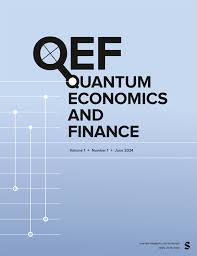The relationship between economics and quantum physics may seem unintuitive, since they are two very different disciplines. However, in recent decades, an interdisciplinary field has emerged that explores how concepts from quantum mechanics can be applied to economic theory and decision making.
The principle that "the observer defines the observed" is one of the most fascinating concepts in quantum mechanics, and can be related to economics from a perspective of how the expectations and perceptions of economic agents influence the outcomes of markets. Let's delve into this analogy between the two fields:
1. “Quantum Uncertainty Principle and Expectations in Economics”
In quantum mechanics, the “Heisenberg uncertainty principle” states that the position and momentum of a particle cannot be known simultaneously with precision. Similarly, in economics, economic agents (such as investors, consumers or companies) cannot know with certainty all the variables that influence a market, such as the future price of an asset or the decisions of other actors. The expectations of these agents influence their behavior, generating an "observer effect" on economic results.
In this sense, “expectation” in economics, like observation in quantum mechanics, changes reality itself. If investors believe a stock will go up, they can buy it en masse, causing it to actually go up. The “perception of agents” defines and modifies the state of the market.
2. “Wave Function Collapse and Economic Decisions”
In quantum physics, a quantum system can exist in a “superposition” of multiple states until observed, at which point it “collapses” into a single given state. In economics, an analogy can be made with the “behavior of markets.” Before key decisions are made (such as the release of economic data, a monetary policy decision, or a geopolitical event), markets are in a kind of overlay, where all possible outcomes are implied in the price. However, when the decision is made or the information is obtained (the "observer" in this case), the market "collapses" into a particular state, reflected in the prices and actions of economic agents.
Here, the act of observing (or receiving information) has a direct impact on the state of the market. This phenomenon is related to the “rational expectations hypothesis” and the “efficient markets theory,” which suggests that prices reflect all available information. But “new information” changes the results and decisions of economic actors.
3. “Observer and Cognitive Dissonance in Economics”
From the perspective of “economic behavior,” investors and consumers are not neutral observers. Their perception and decisions are biased by emotions and cognitive processes, creating what could be called "cognitive dissonance." This bias also acts as an observer that affects the economic system. For example, if an investor decides to ignore information that contrasts with his beliefs, his decision as an "observer" will affect not only his own behavior, but also the market, especially if other investors follow similar patterns.
In your own “cognitive dissonance and investor sentiment thesis project,” you can delve deeper into this idea that investors are not only perceiving the market, but at the same time shaping it. This phenomenon is a clear parallel to quantum physics, where the act of observing affects the state of the system.
4. “Interdependence and Quantum-Economic Networks”
In quantum physics, particles can be "entangled," meaning that the state of one particle is tied to the state of another, regardless of the distance between them. This is similar to how economic agents are “interconnected” in global markets. The decisions of an actor (the observer) in one country can have immediate repercussions in other markets, as observed in global financial interactions.
The fact that the economy is deeply “entangled” and that the decisions of an observer (such as a central bank, a company or an investor) affect markets globally also resonates with the quantum principle of how measurements affect states. of a system.
As in quantum physics, where the observer is not neutral and his act of measurement affects the observed system, in economics, the expectations, perceptions and decisions of economic agents also affect the economic reality they observe. The market is not something static; It continually changes based on how observers (investors, consumers, central banks) interact with it. Therefore, the link between quantum mechanics and economics lies in the “mutual influence” between the observer and the observed, and how that interaction transforms the results in both systems.
TO FINISH
In quantum physics, the observer affects the system by measuring it, a principle that finds parallels in economics, where the expectations and decisions of economic agents directly influence markets. Like the collapse of the quantum wave function, the perceptions of investors and consumers define the behavior of markets by transforming potential futures into concrete economic realities.
This phenomenon highlights how in both physics and economics, the interaction between the observer and the observed is not neutral. Economic agents shape the market through their beliefs, decisions and expectations, generating a dynamic cycle where what is perceived affects and defines the reality of the system.
BIBLIOGRAPHY
- Haven, Emmanuel & Khrennikov, Andre (2013). Quantum Social Science. Cambridge University Press.
- Baaquie, Belal E.(2007). Quantum Finance: Path Integrals and Hamiltonians for Options and Interest Rates. Cambridge University Press.
- Orrell, David (2008). The Future of Everything: The Science of Prediction. Thunder's Mouth Press.
- Schaden, Martin (2002). "Quantum Finance: A Quantum Approach to Stock Price Fluctuations". Physica A: Statistical Mechanics and its Applications, 316(1-4), 511-538.

Comentarios
Publicar un comentario